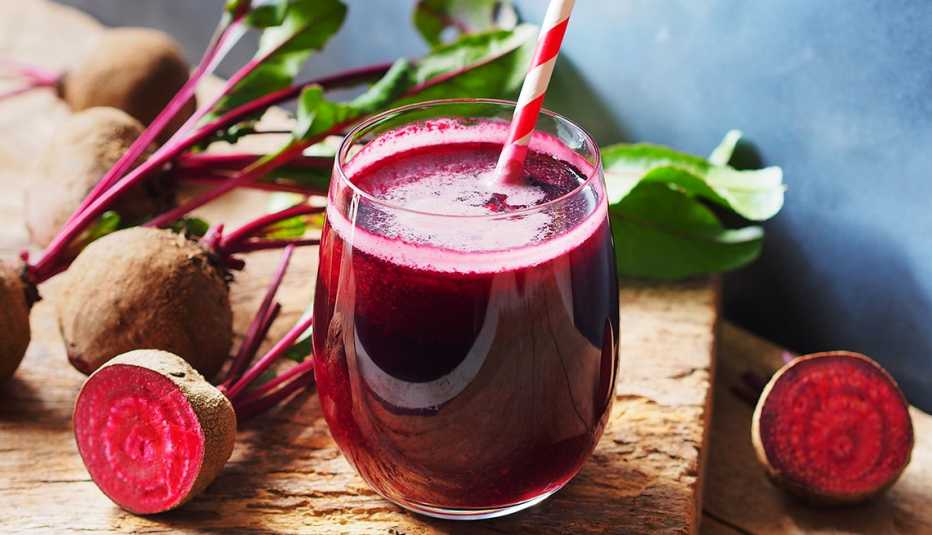AARP Hearing Center


When it comes to heart health, you probably know what the American Heart Association (AHA) offers as its top diet advice: Eat a good balance of fresh, fiber-rich fruits and veggies; whole grains; and healthy proteins, such as nuts, skinless fish and poultry. But recent studies have also named specific cardiovascular all-stars that are worth adding to your rotation. Here are a few standouts to add to your grocery list.
1. Beets
Why: Beets deserve a badge of honor in the veggie family. That’s due to their high doses of nitrates, which help keep blood vessels dilated and lower blood pressure. Plus they are packed with heart-healthy antioxidants, says Kate Patton, outpatient dietitian with the Cleveland Clinic’s Center for Human Nutrition.
.A 2018 review of a decade’s worth of studies identified beet juice consumption as an effective way to control blood pressure in both healthy and hypertensive adults.
Also know: When it comes to heart health, it pays to see red — or orange or yellow. “I tell patients to get a variety of different colored foods,” says Patton.
Try these other blushing nutrient-rich veggies and fruits: carrots, sweet potatoes, acorn squash, oranges, cantaloupe and papaya.
2. Pumpkin seeds and walnuts
Why: A study presented in 2019 at the AHA’s Hypertension Scientific Sessions found that eating pumpkin seeds may help lower blood pressure. According to the AHA, pumpkin seeds are rich in fiber and a variety of nutrients, particularly heart-healthy magnesium (a quarter cup contains 42 percent of the mineral’s RDA). As for walnuts, a 2022 research review found that consuming foods like walnuts that are rich in alpha-linolenic acid was linked to a 10 percent lower risk of cardiovascular disease. And 2021 research published in the American Heart Association’s journal Circulation found that eating a half-cup of walnuts a day for two years modestly lowered the subjects’ LDL cholesterol. “Walnuts are good sources of monounsaturated fats,” Patton says. “For people who don’t eat fish, they are a good way to get in those omega-3 fats.”
Also know: “Any nuts are good sources of monounsaturated fats,” says Kate Patton, lead outpatient dietitian at the Cleveland Clinic. “For people who don’t eat fish, they are a good way to get in those omega-3 fats.” A 2019 study presented at the European Society of Cardiology showed that eating nuts two or more times a week was associated with a 17 percent lower risk of death from heart disease. But remember one word: moderation. These are calorie-dense foods, so keep portions modest and avoid added salt, sugars and oils. Penny Kris-Etherton, Pugh university professor of nutritional sciences emeritus at Pennsylvania State University advises limiting yourself each day to “an amount that will fit in the palm of your hand.”
3. Tofu
Why: “This plant-based soy protein contributes isoflavones and is a substitute for animal proteins to help support flood lipid levels,” says Linda Van Horn, chief of the nutrition division in the department of preventive medicine at Northeastern University.
Researchers at Harvard Medical School and Brigham and Women’s Hospital reported in 2020 that a study of more than 200,000 people found a link between consuming isoflavone-rich tofu more than once a week and an 18 percent lower risk of heart disease. Beyond that, tofu is a great source of plant protein, so it’s a smart substitute for red meat or pork. “It also has phytosterols — plant cholesterols that actually improve the cholesterol in our own bodies,” Brenes-Salazar says.
Beyond that, tofu is a great source of phytosterols — plant cholesterols that can block the absorption of cholesterol, says Patton.
Also know: A 2021 Chinese study found that eating soy four or more days of the week was associated with a significantly lower risk of death from heart attacks. The American Heart Association recommends one to two servings (or 5.5 ounces) f protein — from lean meat, chicken, eggs, fish, nuts or soy products — a day.
Protein is especially important for aging bodies: “On average, most Americans consume enough protein, but older adults may have lower appetites and are at greater risk of muscle loss,” says Patton.





































































More From AARP
Is Dried Fruit Actually Healthy?
Sugar bomb or superfood? Here's what you need to know about the tasty snack
Go Nuts for Brain Health
6 nuts and seeds that may help improve your mood, sharpen your cognition and fend off diseases
25 Foods That Won't Cause Weight Gain
Eat these to your heart's content